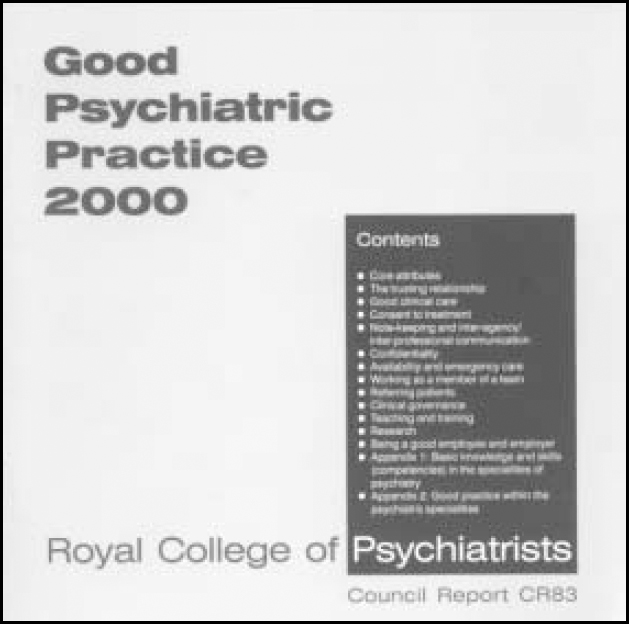This report is the College's contribution to a process that all Medical Royal Colleges are undertaking, the purpose being to set out standards of acceptable practice for the appraisal and revalidation of doctors. It sets out standards for psychiatrists, and juxtaposes these with relevant sections of the General Medical Council's (GMC) Good Medical Practice. The first edition of Good Psychiatric Practice welcomes comments for improvement, which is just as well because the document leaves plenty of scope for this.

The difference between medicine and psychiatry emerges starkly in the first section on the importance of trust in doctor—patient relationships (pp. 5-6). Among other things, the GMC document stresses the importance of respecting patients' rights to be fully involved in treatment decisions, and their right to decline treatment. The College report goes as far as acknowledging that there is a ‘difficulty’ in psychiatry, where those with mental illness may have a different view of their needs from their carers or, more significantly, their psychiatrists. The relationship between doctor and patient in psychiatry and medicine is not the same. Most patients would accept the view of a physician that their chest pain on exertion occurs because their coronary arteries are narrowed. Many psychiatric patients reject the notion that they hear voices because they have a condition that psychiatrists call schizophrenia. Everybody knows that if you decline treatment for angina, no one will force you to take it. This highlights a fundamental weakness of the College report; it fails to acknowledge or grapple with the complex ethical dilemmas that arise when patient and psychiatrist fail to agree on how to understand the nature of the patient's experiences. This failure demonstrates how important it is that we explore the issue of the contested nature of mental illness, both conceptually and ethically. If you like, it demonstrates the need for clinical practice to be combined with a critical philosophical analysis.
This becomes even more apparent when we consider the issue of consent to treatment (p. 15). Conflicting interpretations of mental illness imply conflicting notions of how we should act. Recent user-led research (Mental Health Foundation, 2000; Reference RoseRose, 2001) has illuminated this complex area, demonstrating the need for a diversity of responses. While many service users find medication helpful, many are profoundly unhappy that psychiatry can be used to impose on them a biomedical interpretation of their experiences. This means that good psychiatric practice must involve a great deal more than ‘awareness of the rights of the individual’, or ‘engaging patients… in full and open discussions about treatment options’, and it is sad that the document makes no mention of the role of advocacy or advance directives here. Advocacy is extremely valuable in the difficult ethical negotiations around treatment, especially where coercion is involved (Reference Thomas and BrackenThomas & Bracken, 1999). Psychiatrists' understanding of advocacy leaves much to be desired (Reference Lacey and ThomasLacey & Thomas, 2001), so the report's failure to refer to advocacy is even more significant bearing in mind that the new Mental Health Act will attach particular importance to advocacy for detained patients. Likewise, advance directives can play an important part in extending competence when service users are temporarily not competent to make decisions about their care. Although the legal status of these documents has yet to be established, it would have been helpful if the report had made some reference to advance directives. At the very least there might have been encouragement to the profession to try and respect a patient's directive.
The expression ‘good psychiatric practice’ suggests that we should be concerned above all else with values. Sadly, this document really fails to grapple with the complexities that arise when different values and beliefs conflict in the area of mental health. Given the changing context of mental health care, one that accords greater prominence to users' voices, in the shadow of a Mental Health Act that represents a significant shift from care to coercion, this document will fail to move our practice with the times. But it is a start, and if, as the foreword indicates, there is a willingness to listen to comments, we may yet move on.



eLetters
No eLetters have been published for this article.